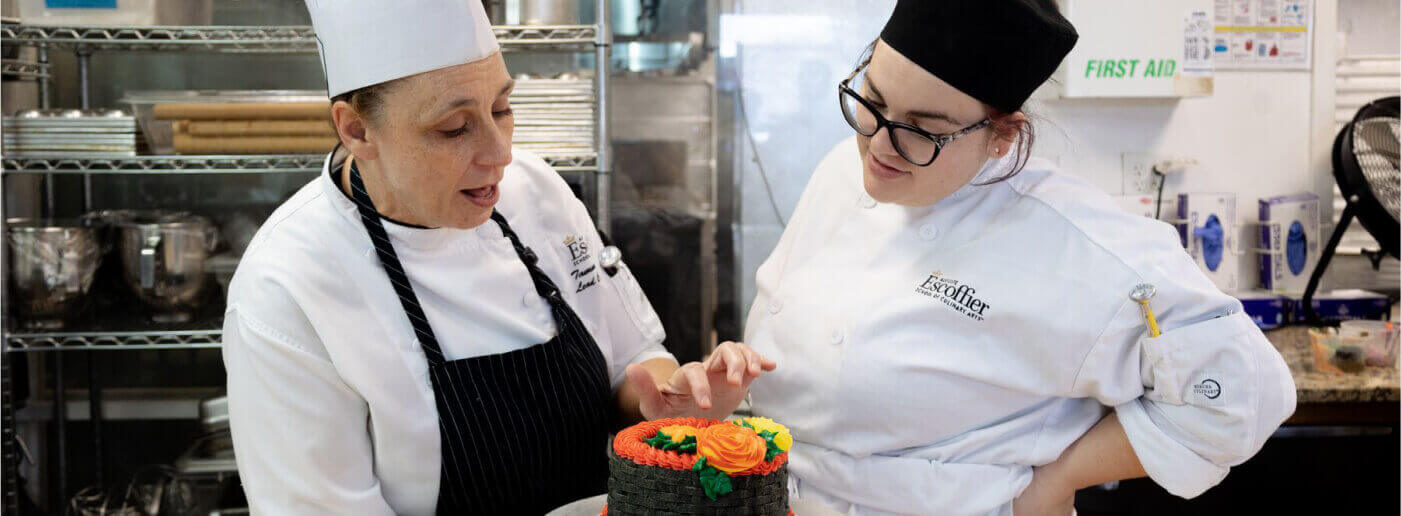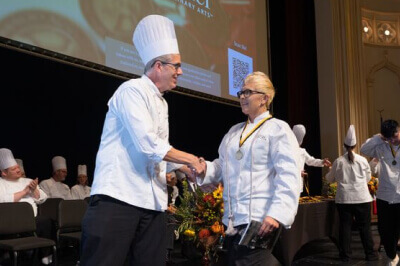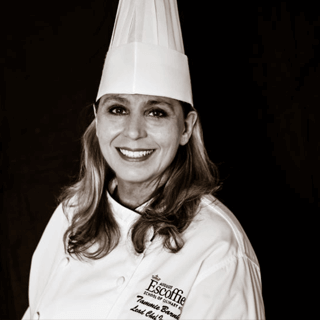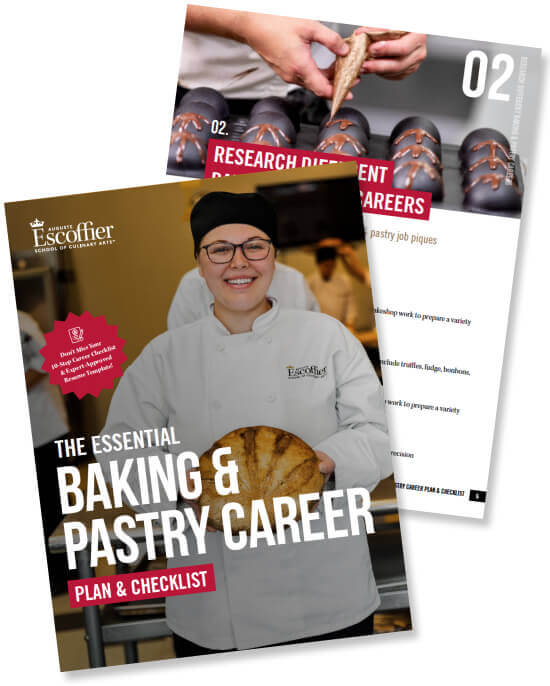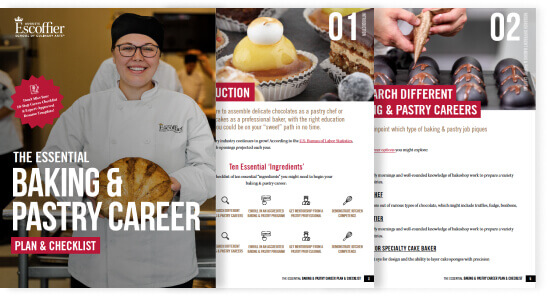BAKING & PASTRY ARTS PROGRAMS
Attend baking classes in Austin, Texas and work towards a baking and pastry degree or diploma in one of the best food cities in the USA.*
*Top 10 Best Cities for Food in the U.S., Food & Wine
Hone your baking & pastry skills on-campus at one of the best pastry programs in Texas*
In Austin’s culinary scene, students are surrounded by a wealth of artisanal bakeries, trendy cafes, and farm-to-table restaurants, immersed in an environment that nurtures creativity and innovation.
At Escoffier’s Austin, Texas campus, you can experience opportunities for practical learning and networking within the industry. Hands-on baking lessons from experienced Chef Instructors go beyond classrooms, offering personalized guidance and real-world expertise on how to succeed post-graduation.
If you dream of pursuing exciting baking and pastry careers in Texas, our pastry programs can prepare you to become a baker, pastry assistant, assistant pastry chef, and more.
Other ways to study baking & pastry:

complete your training in
30‑60 weeks
Escoffier Austin baking & pastry programs are designed to work with your schedule. Set yourself apart as a professional by earning a diploma in a little more than half a year or a degree in a little more than a year.
GRANT OR SCHOLARSHIP AID
73%
The percentage of Escoffier Austin students who received an income-based federal Pell grant and/or a grant or scholarship from another source, according to the National Center for Education Statistics.
Average federal STUDENT Loan Award
$9,750
For all students, the average amount of aid awarded in the form of federal student loans in 2021-22 was $9,750 according to the National Center for Education Statistics.
Ready to Experience the Baking & Pastry Arts in Texas?
When it comes to baking & pastry programs in Texas,
Escoffier Austin can help you take a big next step.
Next start date: May 20, 2024
Texas Baking & Pastry Classes to Help Grow Your Professional Career
The Austin Escoffier campus is designed to help you pursue baking and pastry careers.
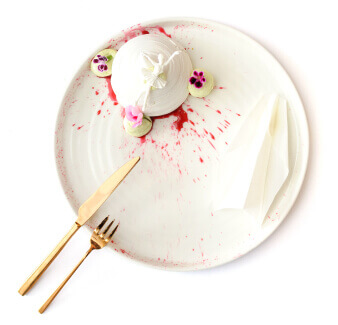
As one of the culinary schools in Texas with a baking & pastry program, the Austin Escoffier campus offers an opportunity for culinary enthusiasts to hone their skills.
The Austin baking classes at Escoffier are known for their hands-on approach, professional instructors, and comprehensive curriculum. Outside of the classroom, Austin’s diverse culinary scene provides the appreciable backdrop for you to immerse yourself in the world of pastries and desserts.
Whether you’re a budding pastry chef or a passionate home baker, attending baking classes in Austin allows you to tap into the rich culinary heritage of Texas while gaining the knowledge needed to build a career in the world of baking and pastry.
- Study at our Austin, Texas campus, which is equipped with 6 learning kitchens
- Get personalized feedback from professional Chef Instructors
- Get baking & pastry job search, interview, and career preparation assistance
- Access to alumni mentorship and employer partner network
The Fundamentals of Baking and Pastry 6-week class begins with course work concentrating on food safety and sanitation in the professional kitchen. The importance of proper hygiene, food handling and storage, cleaning, pest control and HACCP in a food service operation is explored.
Additionally, this course reviews mathematical fundamentals such as multiplication, division, fractions, ratios, baker’s percentage, temperatures, and other mathematical factors related to the baking industry. Students will learn costs and projections as illustrated through yield tests and recipe pre-costs. The course includes baking and pastry mixing methods and ingredient identification. The framework to understand the principles of the following cooking and baking techniques are taught: classic pastry doughs, pate a choux, fried doughs, pies and tarts, baked custards and stove top custards, quick breads, scones, muffins, cookies, brownies and bars, as well as dessert sauces. Basic knife skills are also covered.
The Patisserie 6-week class begins with learning the classic meringue techniques that lead into the creation of European buttercreams. Students will learn classic mixing methods and piping skills. Specialty dessert cakes and decorated special occasion cakes are a major focus of this course work concentrating on factors related to the baking industry. Frozen desserts and plating are focused in this course.
The course includes hand modeling techniques using rolled fondant, gum paste, marzipan, and modeling chocolate. The framework to understand the principles and techniques in the construction of putting together a wedding cake are also covered. Pastry and baking production timelines are examined in this course.
Finally, students are introduced to sugar cookery and fresh fruit dessert items. This course provides instruction, examples, and guidance in the following areas: decorating classic European cakes, rolled fondant designed cakes, hand iced specialty cakes, ice cream and sorbet, candied fruit, gum paste flowers, marzipan and modeling chocolate.
The Artisan Bread 6-week course provides the framework to understand the principles of the following methods and techniques: the methods of pre-fermentation, biga, and sponge, starting and maintaining a variety of sourdough starters, extended fermentation, the 10 steps of bread production, proper shaping, proofing and scoring, whole grain breads, Italian artisan breads, enriched breads, and special occasion/holiday breads, puff pastry and laminated dough.
Students will study the proper techniques in buying, storing and melting chocolate, chocolate tempering, chocolate candies, truffles and pralines, nut based candies, cooked sugar based candies and sugar art showpiece design and execution, chocolate molding, chocolate finishing techniques, chocolate decorations, amenity design & execution, chocolate showpiece design and execution.
This course explores the cultural differences of desserts, as well as the history and importance of international desserts from regions such as Latin America, Spain, Portugal and Morocco, Italy, Africa, Asia, Caribbean and Germanic Countries. This course also includes instruction of molecular gastronomy and contemporary plated desserts.
In addition, students will practice the successful production of high quality products and baked goods in a production environment. The following subjects will be covered: planning and organizing events, writing timelines, and developing seasonal menus. The course will also cover analyzing the most efficient ways to complete assigned tasks and problem solving.
Students gain relevant experience by working in an approved foodservice establishment. Students are required to satisfy 180 working hours and complete other required assignments to fulfill their externship commitment as part of their graduation requirements.
Three out of five restaurants fail within five years of opening, often due to money mismanagement; this course gives students the skills to not only keep their restaurant in business but also turn a profit.
In this course, students study the hierarchy of management in food service, and the skills needed to succeed as a manager: training employees, motivating them, disciplining them, and creating a safe and positive work environment. This course explores different types of menus (including both food menus and beverage menus) and their applications. Aspects of menu planning and design, ranging from visual design to price analysis to making use of available resources are covered.
The menu is both a financial tool and a communication tool, and students learn about its uses as both. Students are introduced to accounting and managing budgets, especially as it relates to the hospitality industry. Students learn how to minimize costs and maintain a full range of customer services.
This course covers such topics as business planning, pricing, credit management, government regulation, and legal concerns. Business ethics and the crucial role and importance of management and leadership are also covered. For the final project for this course, the student will complete and present a business plan for a foodservice operation.
The Professional Communications course emphasizes the principles and practical application of effective professional communication behaviors within professional, business, and organizational contexts. In addition to identifying the importance of effective communication skills to the hospitality industry, communication styles and effective listening methods are addressed.
Students will create and present oral presentations including cooking demonstrations, and special occasion speaking. Listening skills, verbal and nonverbal communication, conflict resolution, cultural differences in communication, and debate techniques are also covered.
Technical Writing prepares students to write in the hospitality and foodservice professions. In a professional setting, writing provides readers information they need in a format they can understand.
Unlike most academic writing, in which students demonstrate their learning to a professor who already knows the subject, in technical communication the writer is the expert, and the readers are the learners. In the hospitality and foodservice industries, students and professionals write a variety of documents for supervisors, colleagues, and customers such as explaining a problem or product, preparing a proposal, or illustrating a project. This course teaches students to adapt their writing to different audiences and purposes.
This course outlines strategies for making subjects clear to readers who need to understand them. To communicate effectively with an audience, writing must meet rigorous editing standards, in addition to writing in a clear, concise style and presenting information logically.
Throughout history, food has done more than just provide nourishment. From prehistoric times to the present day, food and the pursuit of it has had a transformative role in human history. Food has impacted societal organization, industrial development, military conflict, and economic expansion. As epicure and gastronome, Jean-Anthelme Brillat Savarin stated, “Gastronomy governs the whole of human man.” In addition, food also serves a role in the cultural development of religion, economics, and politics. This course examines the role of food and its contribution and influence over history, culture, religion, economics, and politics. Food customs and attitudes are also explored, as well as, the social awareness selected food patterns and customs.
In the Science of Nutrition course, the basic principles of nutrition are investigated. Emphasis is placed on the nutrients, food sources, and their utilization in the body for growth and health throughout life. Contemporary and global nutritional issues are also discussed.
College Algebra is an intermediate-level course in algebra. This course includes topics in equations and inequalities, graphing lines and circles, functions and their graphs, polynomial and rational functions, and exponential and logarithmic functions.
The Fundamentals of Baking and Pastry 6-week class begins with course work concentrating on food safety and sanitation in the professional kitchen. The importance of proper hygiene, food handling and storage, cleaning, pest control and HACCP in a food service operation is explored.
Additionally, this course reviews mathematical fundamentals such as multiplication, division, fractions, ratios, baker’s percentage, temperatures, and other mathematical factors related to the baking industry. Students will learn costs and projections as illustrated through yield tests and recipe pre-costs. The course includes baking and pastry mixing methods and ingredient identification. The framework to understand the principles of the following cooking and baking techniques are taught: classic pastry doughs, pate a choux, fried doughs, pies and tarts, baked custards and stove top custards, quick breads, scones, muffins, cookies, brownies and bars, as well as dessert sauces. Basic knife skills are also covered.
The Patisserie 6-week class begins with learning the classic meringue techniques that lead into the creation of European buttercreams. Students will learn classic mixing methods and piping skills. Specialty dessert cakes and decorated special occasion cakes are a major focus of this course work concentrating on factors related to the baking industry. Frozen desserts and plating are focused in this course.
The course includes hand modeling techniques using rolled fondant, gum paste, marzipan, and modeling chocolate. The framework to understand the principles and techniques in the construction of putting together a wedding cake are also covered. Pastry and baking production timelines are examined in this course.
Finally, students are introduced to sugar cookery and fresh fruit dessert items. This course provides instruction, examples, and guidance in the following areas: decorating classic European cakes, rolled fondant designed cakes, hand iced specialty cakes, ice cream and sorbet, candied fruit, gum paste flowers, marzipan and modeling chocolate.
The Artisan Bread 6-week course provides the framework to understand the principles of the following methods and techniques: the methods of pre-fermentation, biga, and sponge, starting and maintaining a variety of sourdough starters, extended fermentation, the 10 steps of bread production, proper shaping, proofing and scoring, whole grain breads, Italian artisan breads, enriched breads, and special occasion/holiday breads, puff pastry and laminated dough.
Students will study the proper techniques in buying, storing and melting chocolate, chocolate tempering, chocolate candies, truffles and pralines, nut based candies, cooked sugar based candies and sugar art showpiece design and execution, chocolate molding, chocolate finishing techniques, chocolate decorations, amenity design & execution, chocolate showpiece design and execution.
This course explores the cultural differences of desserts, as well as the history and importance of international desserts from regions such as Latin America, Spain, Portugal and Morocco, Italy, Africa, Asia, Caribbean and Germanic Countries. This course also includes instruction of molecular gastronomy and contemporary plated desserts.
In addition, students will practice the successful production of high quality products and baked goods in a production environment. The following subjects will be covered: planning and organizing events, writing timelines, and developing seasonal menus. The course will also cover analyzing the most efficient ways to complete assigned tasks and problem solving.
Students gain relevant experience by working in an approved foodservice establishment. Students are required to satisfy 180 working hours and complete other required assignments to fulfill their externship commitment as part of their graduation requirements.
Students gain relevant experience by working in an approved foodservice establishment. Students are required to satisfy 180 working hours and complete other required assignments to fulfill their externship commitment as part of their graduation requirements.
Participating in a practical externship at a bakery or restaurant can provide the mentorship and hands-on experience essential for pursuing your desired jobs in baking and pastry arts
Whether you’re dreaming of becoming a baker, learning professional pastry skills from experts, or exploring the process of starting a home bakery, your externship can give you a valuable chance to reach your goals as a professional in the industry.
Request InformationIt’s a wonderful program. I did my first externship at Dollywood and am now working there as a pastry chef. It’s amazing!”*
Explore Options to Help You Afford to Attend a Baking and Pastry Program in Austin, TX
*76% of Austin students who entered postsecondary education for the first time received some financial assistance in 2021-22 for those who applied and qualified, College Navigator, National Center for Education Statistics
Federal Financial Aid
Scholarships and Grants
Military Benefits
The average net price was $16,238 for grant or scholarship aid for students in the largest program for the time in academic year 2021-22.*
*College Navigator, National Center for Education Statistics
Associate of Applied Science Degree in Pastry Arts
Program Cost: $37,370†
Program Length: 60
weeks
Diploma in Pastry Arts
Program Cost: $21,878†
Program Length: 30
weeks
†Total program cost includes tuition, uniform, and tool kit. The Associate of Applied Science Degree in Pastry Arts cost also includes course packs. The cost of books is not included. Students may choose to purchase books when enrolling. For more cost details, see the catalog.

Calendar weeks required to complete the degree or diploma program.
Hours per week recommended for academics and school-related activities, depending on the student’s learning style.
Approximate time required to complete an online application. Apply today!
Discover the bold flavor palates, quirky eateries, and indulgent southern desserts that make Texas Texas
Austin is a vibrant, eclectic, and one-of-a-kind city. Explore how the essence of Austin extends to its local food scene:
Charming Southern Bakeries
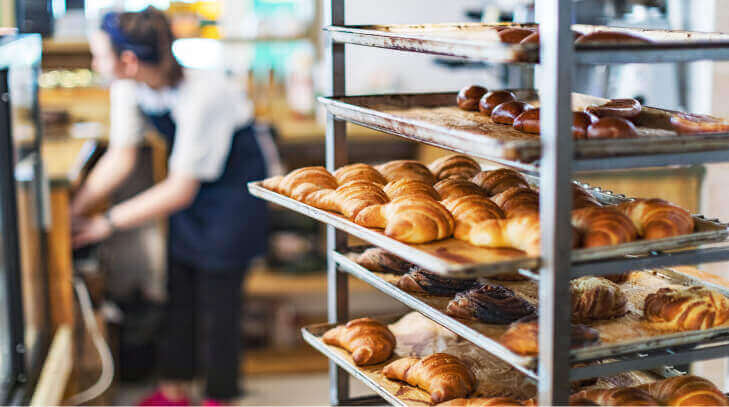
Community Farmers’ Markets
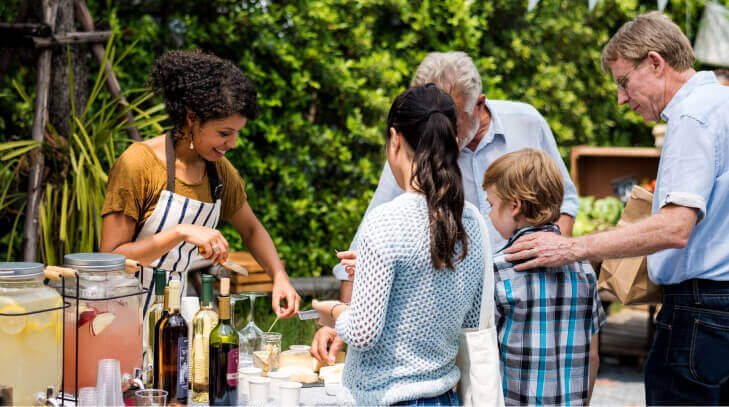
Lively Food Festivals

Immersive Food and Beverage Tours

Looking to Call Texas Home?
Austin Escoffier Students Have Housing Options
While we don’t provide on-campus housing, we collaborate with select housing partners in the Austin, TX area. Explore options ranging from apartment complexes to dorm-style accommodations. We’d love to help you find a home in Austin!
Need a place to live in Austin?
Explore all of your options from our select
housing partners.
The Escoffier Austin Campus is Accredited and Respected Worldwide
The reputation of the institution where you earn your degree or diploma is an important measure of value, and Auguste Escoffier School of Culinary Arts in Austin is nationally accredited by the Council on Occupational Education (COE). It’s also approved and regulated by the Texas Workforce Commission-Career Schools and Colleges, and is authorized as an Associate of Applied Science degree–granting institution through the Texas Higher Education Coordinating Board.
#1 in the world
Ranked best culinary school in the world by Chef’s Pencil 2020
LARGEST IN THE USA
Escoffier is the largest culinary school brand in the United States*
TOP 10 SCHOOLS
Top 10 culinary schools in the United States – USA Today 2019
Nationally Accredited school
Accredited by the Council on Occupational Education (COE)
*Based on comparable student population data for Austin and Boulder as currently reported in Integrated Postsecondary Education Data System (IPEDS).
The doors that are opened by being at the Austin campus are mind-blowing. You get to meet with a lot of chefs that you probably wouldn’t be able to meet in your normal life. You can’t match that.”*
*This information may not reflect every student’s experience. Results and outcomes may be based on several factors such as geographical region or previous experience.
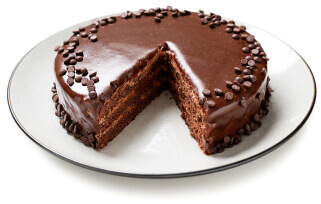
Get to Know Your Austin Escoffier Baking and Pastry Chef Instructors
Our Austin Escoffier instructors are not just educators; they can also push you to strive for personal growth, constantly challenging you to reach for the best version of yourself. They are committed to helping you overcome obstacles in your baking journey and stretch your creativity in the kitchen to make culinary creations that you’re proud of.
Escoffier’s Texas instructors bring a rich blend of industry expertise, skill, and enthusiasm to the classroom, helping you to gain a comprehensive, hands-on education that can help prepare you for a professional baking & pastry job.
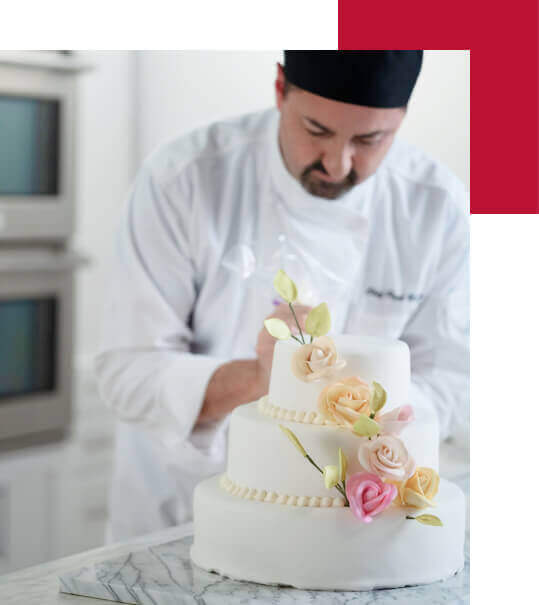
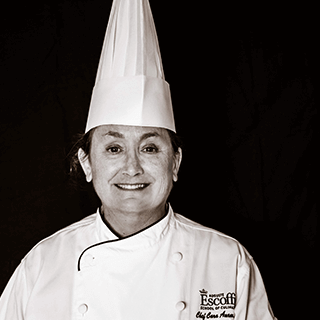
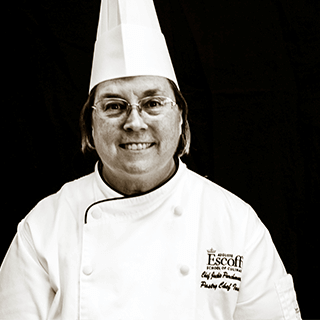
A baking & pastry diploma or degree from Escoffier Austin can help your professional career thrive
By studying in Texas, you can not only gain a strong foundation in the baking and pastry arts, but also have the opportunity to infuse your creations with the unique flavors and trends of Austin. The city’s emphasis on farm-to-table and locally-sourced, fresh ingredients fosters a deep appreciation for sustainability, a growing focus in the culinary world.
The abundance of restaurants, bakeries, and events in Austin provides ample opportunities for externships and real-world experience, allowing you to build a strong professional network and refine your skills. These opportunities make studying baking and pastry in Austin a potential gateway to a dynamic and rewarding career in the culinary arts.
53,500
Unfilled Jobs
The commercial baking industry is facing a significant workforce shortage. By 2030, projections suggest that there could be a shortfall of 53,500 jobs, with a ripple effect throughout the supply chain.*
*American Bakers Association Warns of Looming Workforce Shortage, America Bakers Association
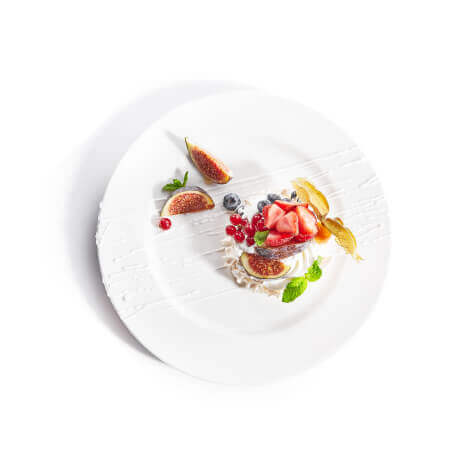
EXAMPLE Job Titles
- Baker
- Pastry Cook
- Assistant Pâtisserie Chef
- Pastry Assistant
- Bakery Manager
- Chocolatier
- Bakery Café Cook
- Dessert Food Truck Cook
- Boutique Baker
- Home Bakery Owner
- Cake Decorator
- Recipe Developer
EXAMPLE Austin employers
- Bakeries
- Cafés & Coffee Shops
- Restaurants
- Supermarkets
- Catering Companies
- Food Magazines & Blogs
- Dessert Boutiques
- Food Trucks
- Chocolate Shops
- Resorts & Spas
- Retirement Communities
EXPLORE CAREERS AND EXTERNSHIPS IN OUR CAREER CENTER WITH THE HELP OF OUR AUSTIN CAREER SERVICES specialists
Get “insider knowledge” on how you can uncover career opportunities with our employer partners in Texas.
Career Planning
Resume and Portfolio Assistance
Interview Preparation
Escoffier Austin Admissions Requirements
What’s required to enroll in a baking & pastry program in Austin? Escoffier Austin requires a high school diploma or general equivalency diploma (GED). You do not need any specific work experience, nor do you have to take the ACT or SAT to be admitted to any program at Escoffier. For more information, see our catalog.
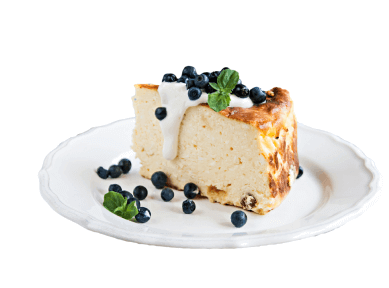
Frequently Asked Questions About Our Austin Baking and Pastry Arts Programs
To be considered for baking and pastry programs at Auguste Escoffier School of Culinary Arts in Austin, you need to have proof of high school completion or equivalent. This must be obtained through one of the following prior to the expected start date:
- High school diploma
- High school equivalency exam: GED, HiSet, or TASC
- State-approved homeschool certificate of completion
- Official college transcript from a completed Associate or higher degree program (degree must be in a program that fully matriculates into a bachelor’s level program)
- DD-214 for U.S. veterans, which reflects high school equivalency
No, SAT scores are not required to attend the Escoffier Austin campus. These are the requirements to be considered for admission to Escoffier in Austin, TX:
- Application for admission
- Proof of high school completion or equivalent
- AESCA Enrollment Agreement (inclusive of written permission of parent or guardian if under 18)
- Admissions interview
- Tour of facility
- Record of previous education & training (CSC-010)
- Receipt of enrollment policies (CSC-005)
- Information release form (FERPA)
The total program cost for the Diploma in Pastry Arts program at the Escoffier Austin campus is $21,878. The total cost for the Associate of Applied Science Degree in Pastry Arts program is $37,370.*
*Total program cost includes tuition, uniform, and tool kit. The Associate of Applied Science Degree in Pastry Arts cost also includes course packs. The cost of books is not included. Students may choose to purchase books when enrolling. For more cost details, see the catalog.
Financial aid is available for those who apply and qualify.
76% of Austin campus students who entered postsecondary education for the first time in academic year 2020-21 received some financial assistance. You can learn more about the financial aid process and speak with a financial advisor to help guide you through the process.
The Diploma in Pastry Arts takes 30 weeks to complete. The Associate of Applied Science Degree in Pastry Arts can also be completed in 60 weeks.
Yes, you could learn both baking and cooking skills as part of the curriculum at the Austin, TX campus. The school offers comprehensive programs that cover a wide range of culinary techniques, including baking, pastry arts, and cooking. You can learn fundamental skills as well as additional industry standard techniques that can help to prepare you for a career in the culinary industry.
The Austin Pastry Arts programs offer a wide variety of baking classes. Both the diploma and degree programs in Pastry Arts include the following courses that could provide a thorough education in baking and pastry: The Fundamentals of Baking and Pastry, Patisserie, and Confiserie and Artisan Baking.
Auguste Escoffier School of Culinary Arts is a licensed and accredited postsecondary institution, but it would be considered a culinary trade school rather than a traditional college. The programs focus on hands-on training and skills development that could prepare students for careers in the culinary and hospitality industries. This trade school model often appeals to students due to its shorter timeline to completion and lower cost compared to many colleges, allowing them to enter the workforce more quickly with technical knowledge relevant to their field.
Yes, the Pastry Arts curriculum in Texas includes classes such as Patisserie and the Fundamentals of Baking & Pastry that cover various aspects of cake decoration, including frosting techniques, piping, fondant work, and creating decorative elements for cakes.
No, you do not need to be a Texas resident to attend the Auguste Escoffier School of Culinary Arts at the Austin campus. The school welcomes students from all over the country and internationally. The Austin, TX campus is approved to issue international students a Form I-20. After you receive the Form I-20 and register in SEVIS, you may apply at a U.S. Embassy or Consulate for a student (F or M) visa.
Escoffier is considered a culinary trade school. Trade schools emphasize hands-on training and skill development, equipping students for careers in the culinary and hospitality industries. They also offer a shorter timeline to completion compared to traditional colleges, enabling students to enter the workforce faster.
In Texas, you typically do not need a specific degree to become a pastry chef. However, many pastry chefs pursue formal education and training in culinary arts or pastry arts to enhance their skills and job prospects. Additionally, by enrolling in a Pastry Arts program at Escoffier, students can gain experience through externships and network with professional Chef Instructors, which can be invaluable for opening up job opportunities in the baking & pastry industry.
Yes, there are scholarships available for Escoffier Austin students who apply and qualify, including Work & Learn Scholarships, the Student Veteran Scholarship, and merit-based scholarships. Learn more about the scholarships that you may qualify for.
Escoffier’s campus in Austin, Texas is a culinary school that offers baking and pastry programs as well as programs in the culinary arts. That is why we do not refer to our institution as a “pastry school,” although you are likely to find many similarities between our programs and those offered by baking and pastry schools in Texas and nationwide.
